Scharffs Lectures on the Role of Religion and Religious Freedom at Muhammadiyah University
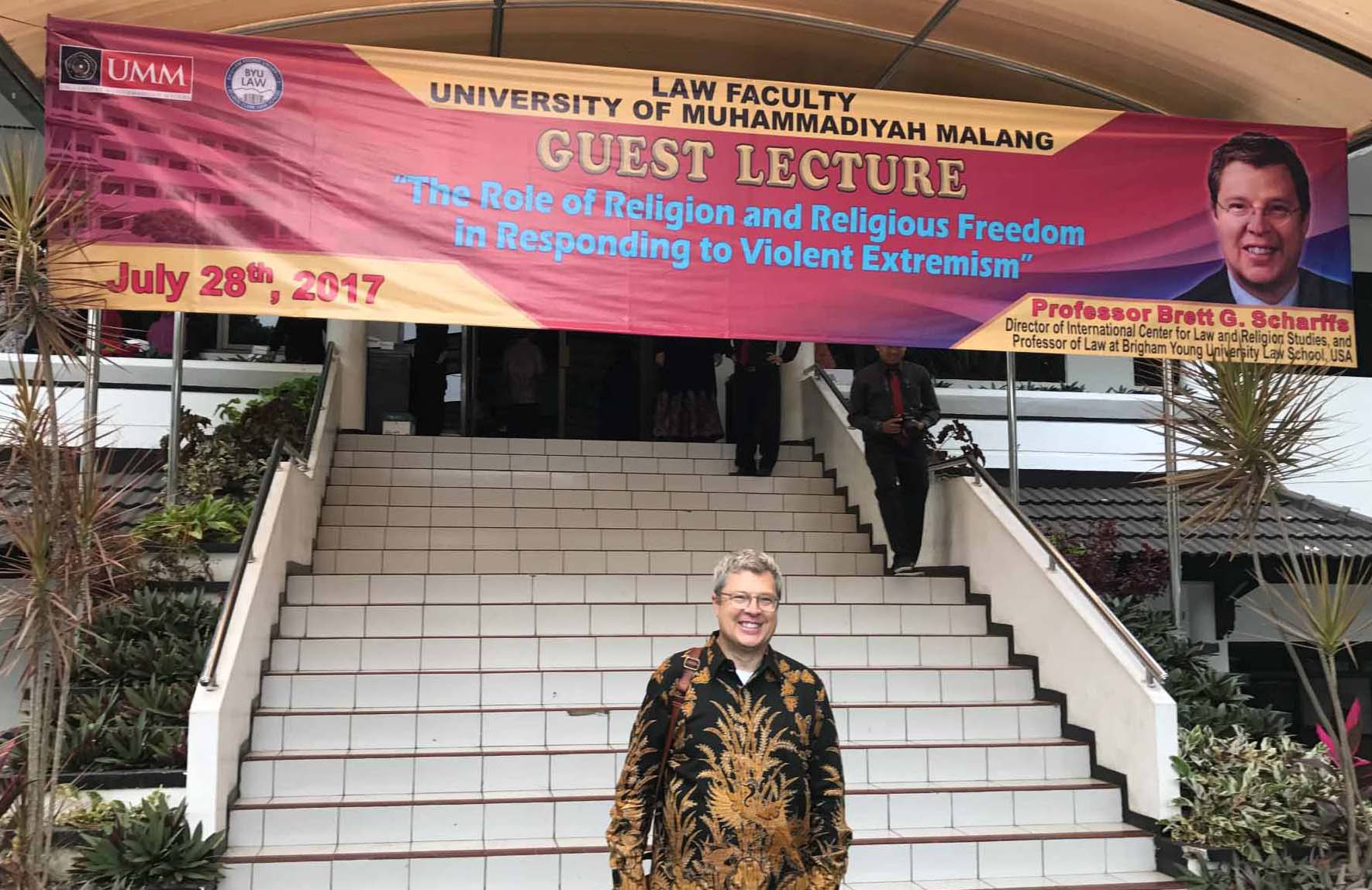
While in Asia during July 2017, Professor Scharffs was a guest lecturer at the Law Faculty of the University of Muhammadiyah in Malang, Indonesia. The lecture, attended by the entire law school community, addressed the topic, “The Role of Religion and Religious Freedom in Responding to Religious Freedom.” In this lecture, Professor Scharffs noted that while religion and religious freedom can both be used to foment violence in the name of religion, both religion and religious freedom play important roles in responding to and creating resistance towards violent extremism. The lecture was convened and hosted by Muhammadiyah Law School Dean Sulardi and University Vice Rector, Professor Syamsul…
Scharffs participates as panelist at Open Forum on “Relations between Religious Minorities, Majorities and the State in Indonesia and the United States”
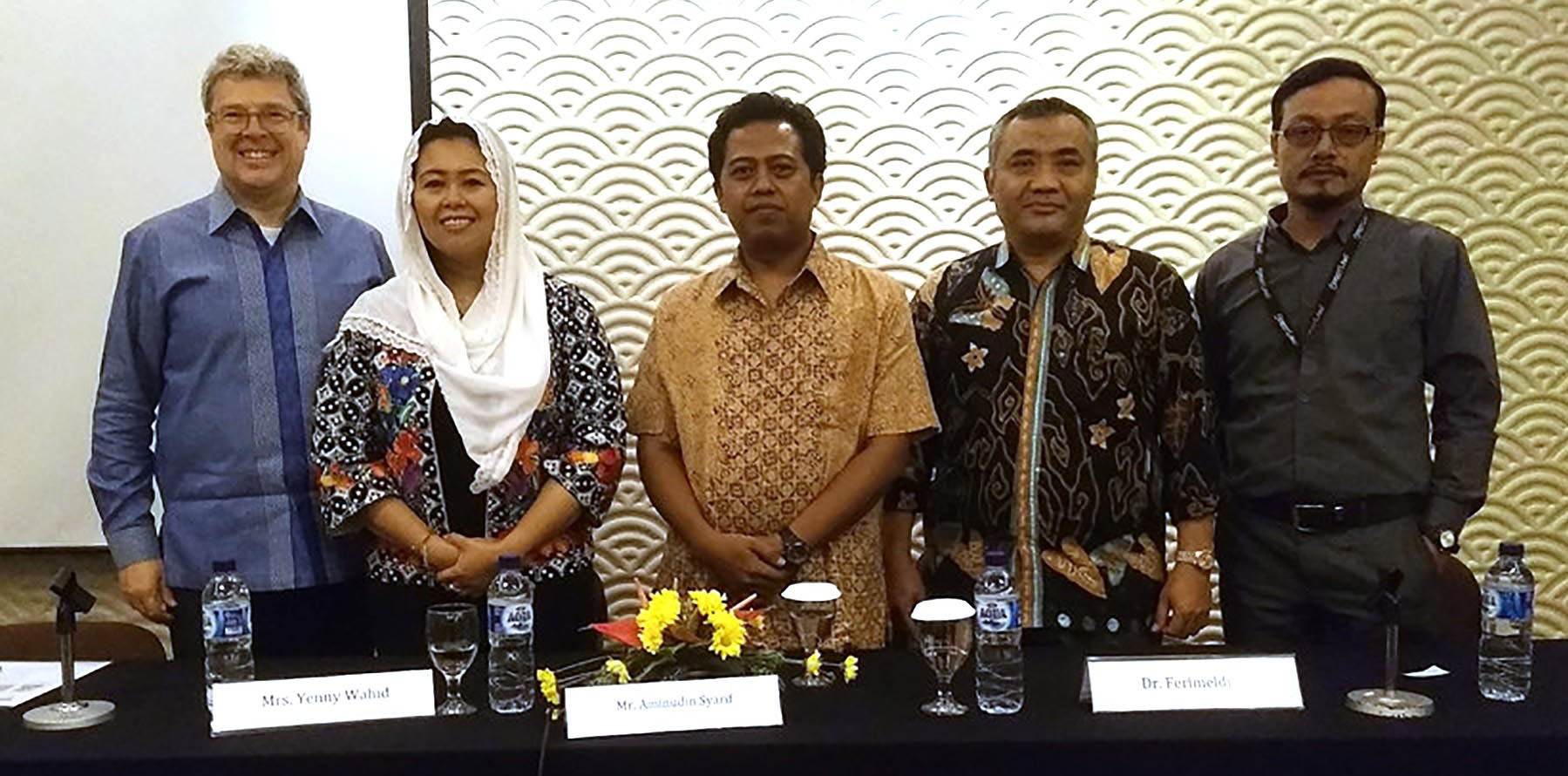
On July 31, 2017, Center Director Brett Scharffs was a panelist at a special Open Forum on “Relations between Religious Minorities, Majorities and the State in Indonesia and the United States: Current Trends and Issues,” sponsored by the U.S.-Indonesia Society (USINDO), in Jakarta, Indonesia. Panelists included Yenny Wahid, Indonesian Co-Chair, Indonesia-US Council on Religion and Pluralism and Executive Director of the Wahid Foundation, Prof. Dr. Nur Syam, Secretary-General, Ministry of Religious Affairs, Republic of Indonesia, and Febi Yonesta…
Scharffs is Guest Lecturer, Intersession Seminar on Religion and Human Rights, Center for Religious and Cross-cultural Studies, Graduate School, Universitas Gadjah Mada, Yogyakarta
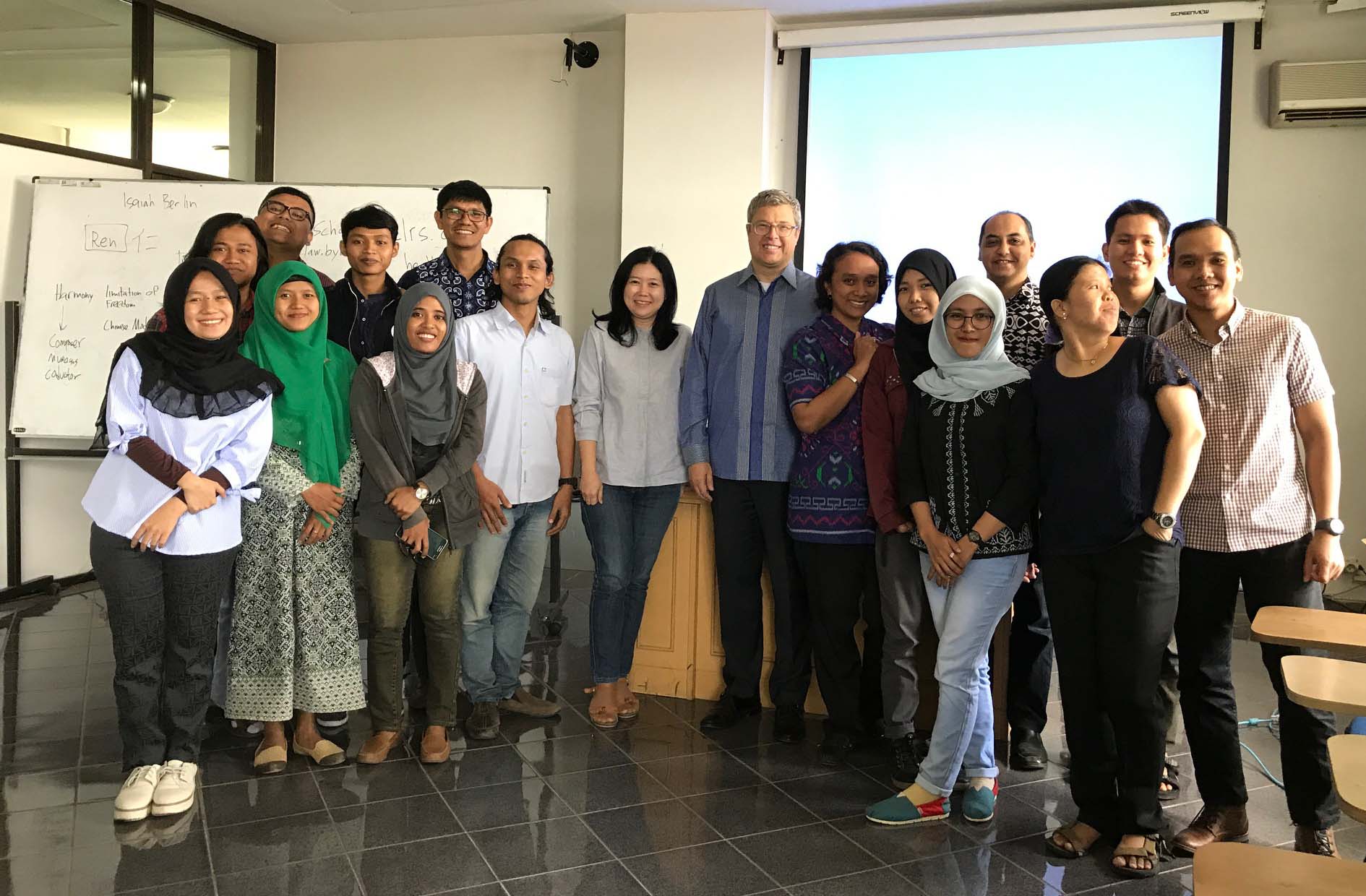
In July 2017, Professor Scharffs was a guest lecturer for a half-day in the first-of-its-kind Intersession Seminar on Religion and Human Rights at the Gadjah Mada University in Yogyakarta, Indonesia. The Seminar, taught by Professor Zainal Bagir of the Graduate School of UGM and Dr. Suhadi of the Graduate School of Sunan Kalijaga State Islamic University, introduces students to the many facets of the interface between the discourses of human rights, and in particular freedom of religion and belief, and how they have been understood by religious communities, and how they have been implemented in international, national, and local law. Professor Scharffs lectured on the drafting and background…
Scharffs Lectures as Visiting Professor, Masters Level Course on Shari’a and Human Rights, Muhammadiyah University, Malang, Indonesia
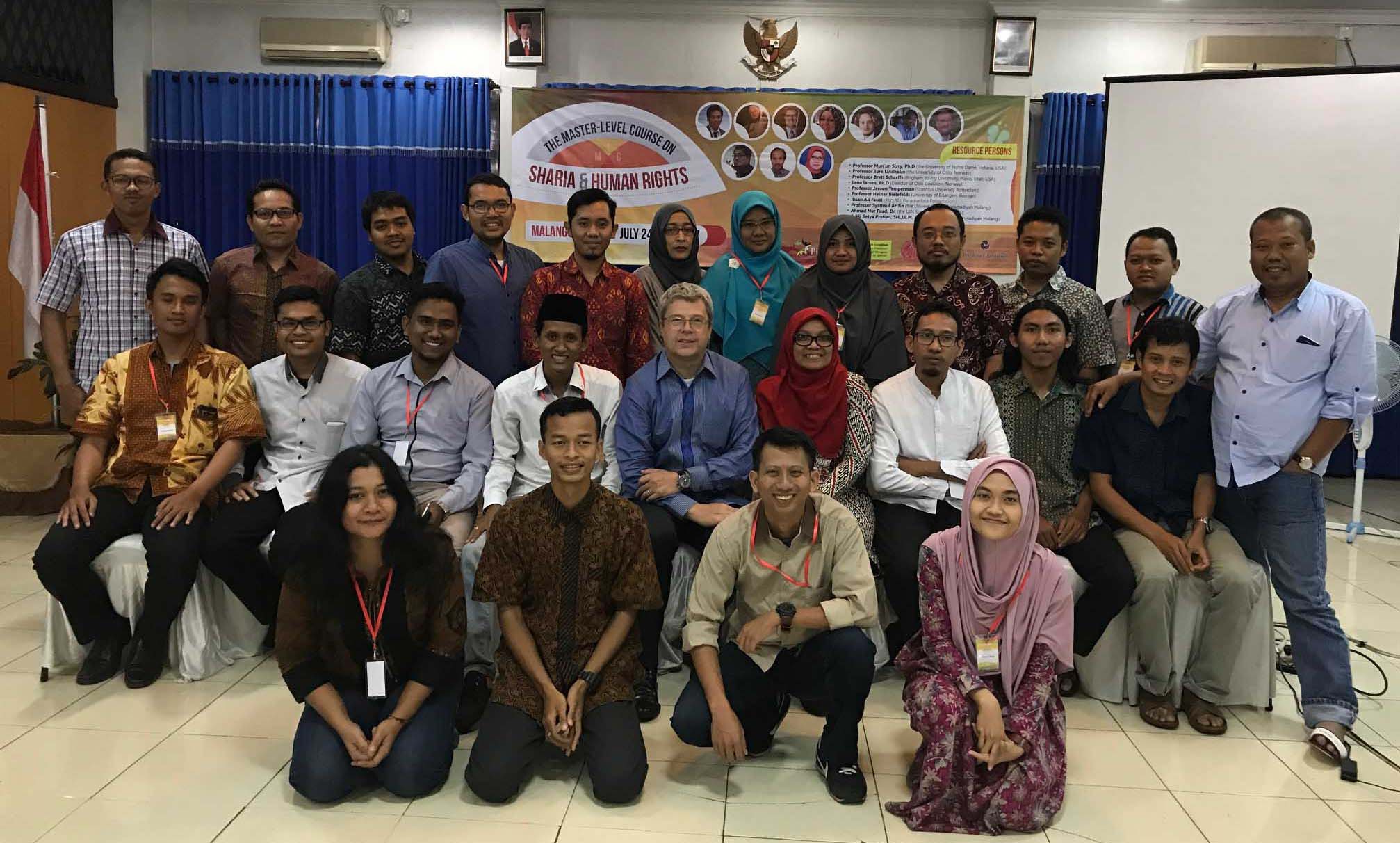
In July 2017 Professor Brett Scharffs lectured for the sixth consecutive year at the Masters Level Course on Shari’a and Human Rights at Muhammadiyah University in Malang, Indonesia. This innovative course is designed to create avenues of discourse between two important world legal systems, Islamic law and human rights law. Professor Scharffs taught classes on the foundations of human rights, the right of freedom of thought, conscience and belief, and the regulation of religion under the rule of law. The Course was expanded in 2016 into a two-year master’s degree program on Shari’a and Human Rights at Muhammadiyah University, with the financial support of the Asia Foundation….
First-of-its-kind Master’s Degree in Sharia and Human Rights Announced – May 2016
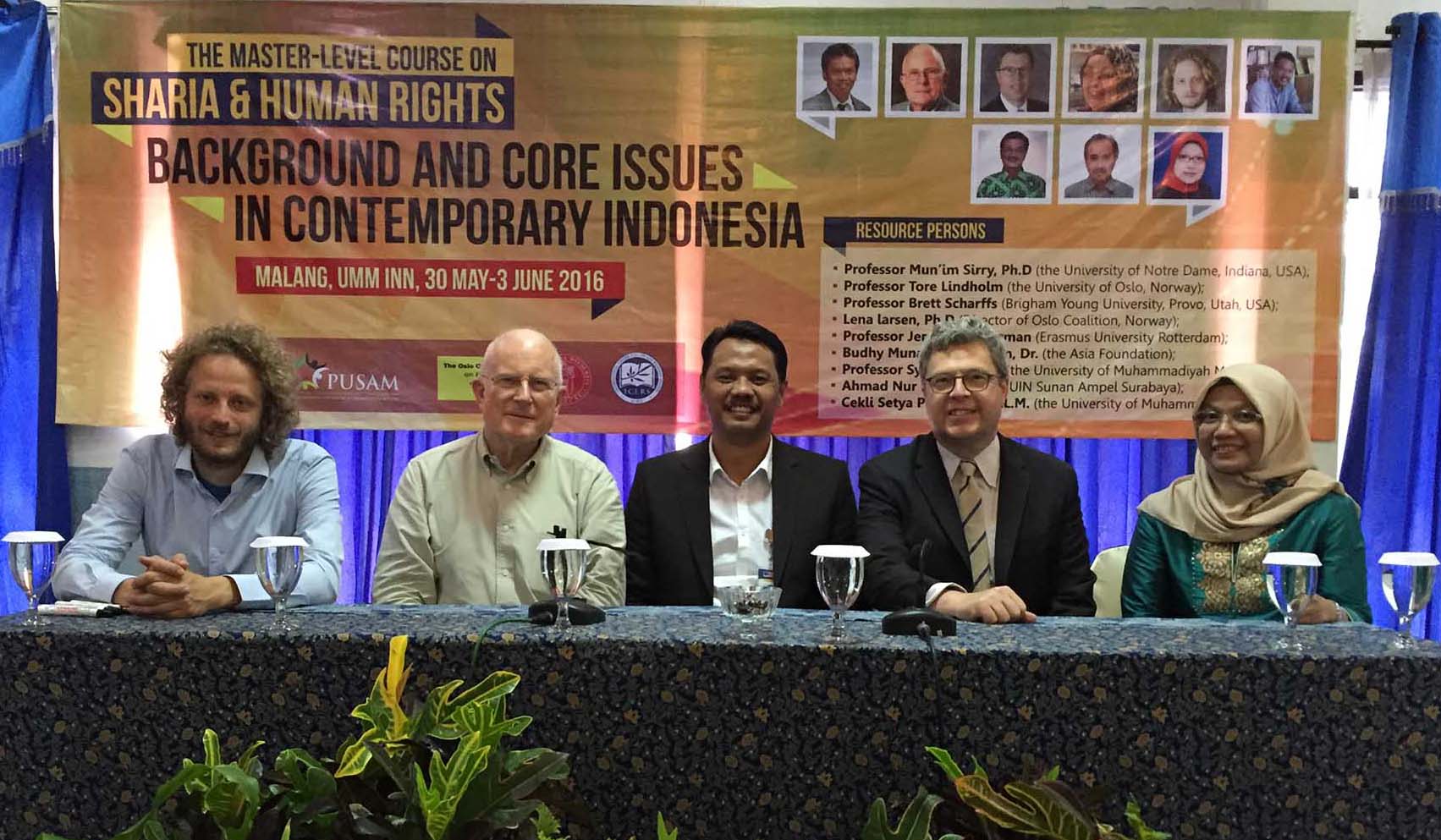
ICLRS Director Brett Scharffs participated in the announcement of the creation of the first-of-its-kind Master’s Degree Program on Sharia and Human Rights at Muhammadiyah University in Malang, Indonesia. The announcement came on May 30, 2016, at the opening of the fifth annual Master’s Level Course on Sharia and Human Rights held at the University, which Scharffs has helped organize and teach. The Masters’ level Course (MLC), which began five years ago as a special side-course, has now been approved as an official for-credit course in the University’s curriculum. And now a full Master’s Degree focusing on Sharia and Human Rights will build upon the curriculum used in the MLC….
Brett Scharffs at Third Yogyakarta Short Course on Sharia and Human Rights – May 2016
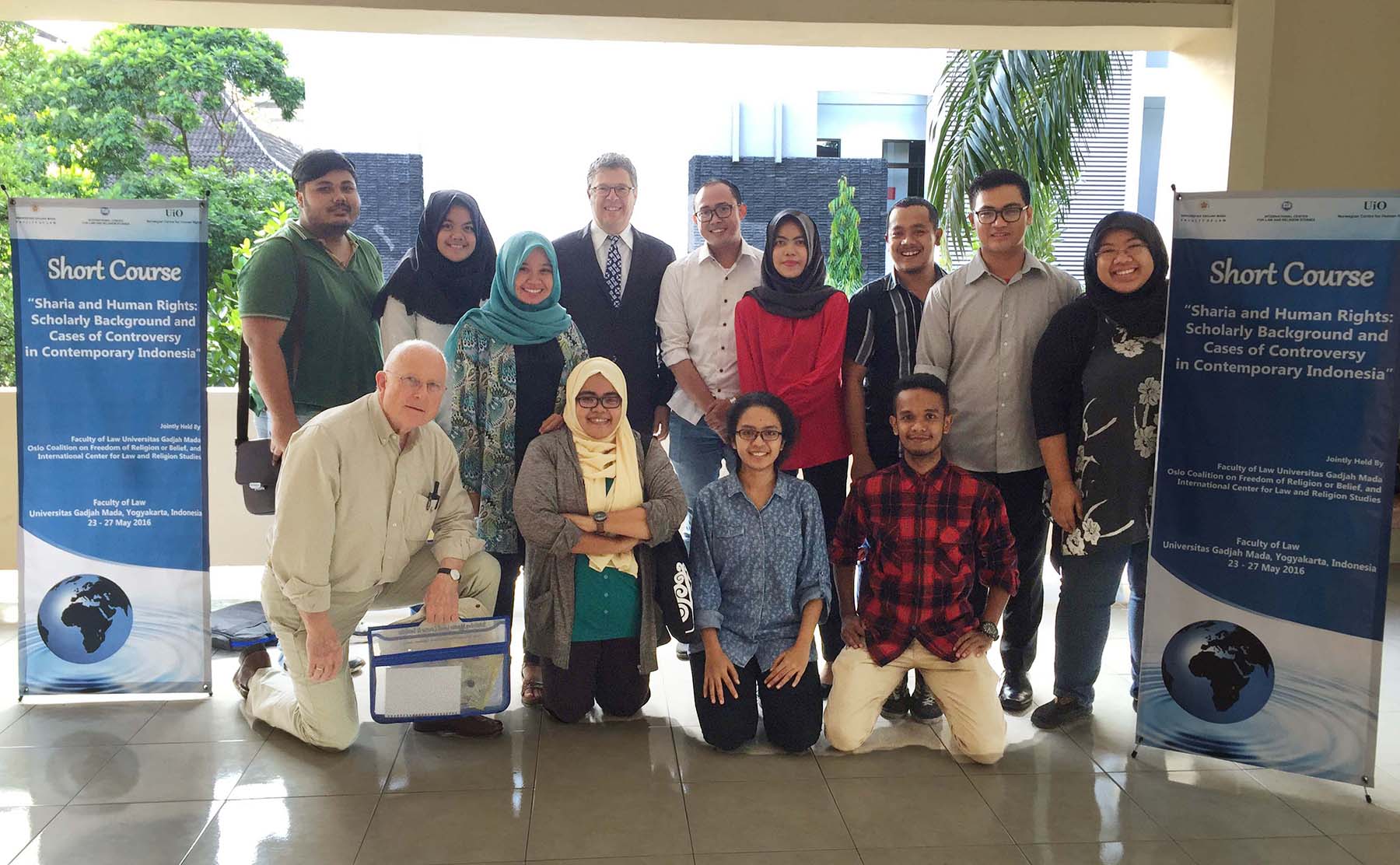
Center Director Brett Scharffs participated in a Short Course on “Sharia and Human Rights: Scholarly Background and Cases of Controversy in Contemporary Indonesia,” held at Universitas Gadjah Mada, one of Indonesia’s leading state universities, in Yogyakarta, Indonesia, from May 23-27, 2016. This was the third year Professor Scharffs helped organize and teach in this program.
The Short Course, which was modeled on a similar course at Muhammadiyah University that was taught for the fifth time the following week, is designed to find networks of discourse between two very different types of legal systems – International Human Rights law and Islamic Law. The course brings together leading experts from Indonesia and beyond on…
Professor Scharffs: Two Indonesia Programs on Sharia and Human Rights – June 2015
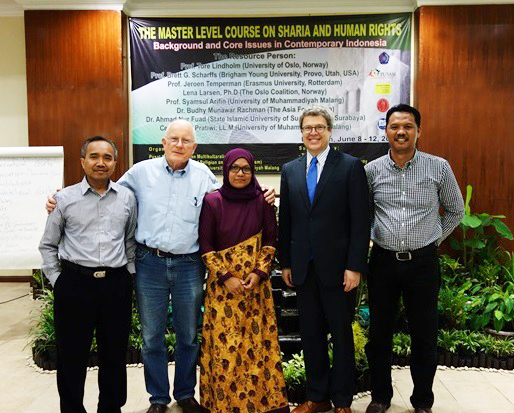
In June 2015 Professor Brett Scharffs participated in two teaching programs designed to create bridges between Islamic Law and Human Rights. One program was held at a leading secular university in Yogyakarta, Gadja Mada University, and the other was at an Islamic University in Malang, Muhammadiyah University. The programs bring together experts on Human Rights and on Islamic Law with students of law, Islamic Law, sociology and history, as well as practitioners from a range of NGOs. Professor Scharffs made presentations on the history and drafting of the Universal Declaration of Human Rights, and freedom of religion from a human rights perspective. The papers from the courses are being compiled into a textbook that will be published in both English and Bahasa in Indonesia next year. John Lowe, who just completed his first year at BYU Law School, also participated in the program, providing informal translation support and helping with logistics.
Intensive Master Level Course in Yogyakarta : Sharia and Human Rights: Scholarly Background and Cases of Controversy in Contemporary Indonesia – 2014
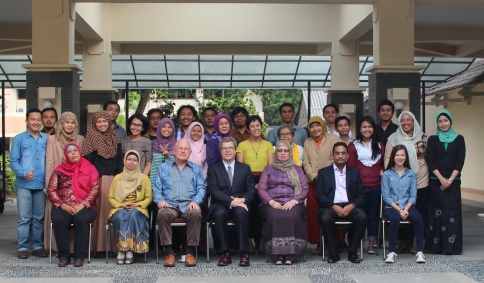
Professor Brett G. Scharffs, Associate Dean for Faculty and Curriculum, Francis R. Kirkham Professor of Law, and Associate Director of the International Center for Law and Religion Studies at BYU Law School, participated in an Intensive Master Level Course on Sharia and Human Rights: Scholarly Background and Cases of Controversy in Contemporary Indonesia, held in Yogyakarta, Indonesia, 2-6 June 2014. The event was co-sponsored by the International Center for Law and Religion Studies, the Oslo Coalition on Freedom of Religion or Belief, and the Faculty of Law, Universitas Gadjah Mada…
Scharffs at Indonesian Conference on Shari’a and Human Rights, 13-16 June 2011
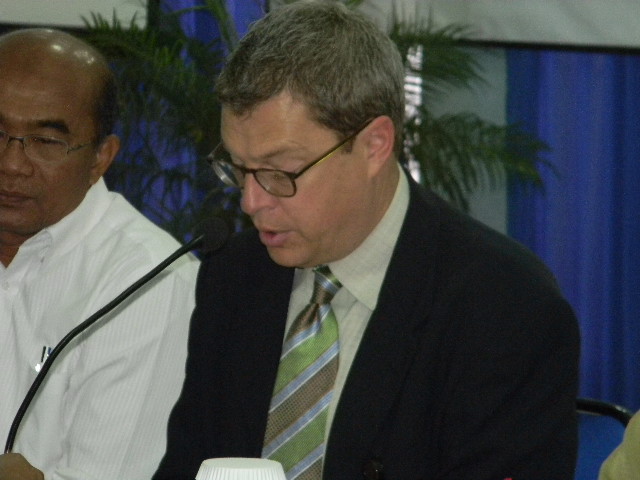
Professor Brett Scharffs, Francis R. Kirkham Professor of Law at the J. Reuben Clark Law School and Associate Director of the International Center for Law and Religion Studies at BYU, participated in an Expert Conference on the Master Level Course on Shari’a and Human Rights: Background and Core Issues in Contemporary Indonesia, held at the University of Muhammadiyah in Malang, Indonesia on June 13-16, 2011. This was the latest in a series of conferences held in Indonesia designed to discuss the relationship between Islamic law and human rights, and to help lay the groundwork for designing a high-quality master-level course suitable for teaching at Islamic universities in Indonesia about the intersections, harmonies and conflicts that arise between Shari’a and human rights, particularly in the Indonesian context.
The conference was sponsored by the Centre for the Study of Religion and Multiculturalism (PUSAM), a postgraduate program at the University of Muhammadiyah Malang (UMM), one of the leading private Islamic universities in Indonesia. It was co-organized by the Oslo Coalition and the Norwegian Centre for Human Rights (NCHR), University of Oslo, Norway, in cooperation with the International Center for Law and Religion Studies at BYU.
Foreign participants at the conference included leading experts in both international human rights and Islamic law, including Dr. Mohammad Hashim Kamali, President and CEO of the Institute for Advanced Islamic Studies in Kuala Lumpur, Malaysia, Dr. Lena Larsen, Programme Director of the Oslo Coalition of the Norwegian Centre for Human Rights, Dr. Tore Lindholm, professor of philosophy at the University of Oslo and member of the Oslo Coalition, Dr. Abdu Saeed, professor of Islamic studies at the University of Melbourne, Professor Scharffs, and Aksel Tomte, representing the Indonesia program of the Oslo Coalition/Norwegian Center for Human Rights.
More than forty professors from Indonesia representing fields including Islamic studies, law, human rights, sociology and history participated in the conference, including Professor Syamsul Arafin, Univeristy of Muhammadyah Malang (UMM), who chaired the organizing committee. Papers were presented by Professor Hafid Abbas, National University of Jakarta, Professor Amin Abdullah, professor of Islamic studies, Islamic University of Yogykarta (UINJ), Professor Musdah Mulia, Islamic University of Jakarta (UIN Jakarta), and Professor M. Latief Fauzi, Indonesian Islamic University (UII).
Professor Scharffs presented a paper, “Challenges to Effective Protection of Freedom of Religion or Belief in Highly Diverse Settings,” which outlined a range of social attitudes towards religion that might prevail in a society, the types of public policies and legal mechanisms for regulating law that typically follow from those attitudes, and the distortions and challenges that arise at each of these point along the spectrum of attitudes and policies. He then suggested specific strategies for mitigating the problems that arise that are helpful in effectively protecting freedom of religion and belief, including:
• recognizing the value and positive social effects of pluralism,
• creating presumptions for freedom within a human rights framework and imposing limitations upon religious freedom only when genuinely necessary,
• focusing upon ways in which the needs and interests of local religious majorities as well as minorities can be recognized and respected,
• recognizing that in a global world everyone is a religious minority and understanding the benefits that flow from adopting policies that genuinely reflect the experience of religious minorities within our societies,
• having attitudes towards religious change that view it not as an act of treason or rebellion, but a normal aspect of human moral agency, freedom and dignity,
• utilizing ordinary laws to deal with issues that arise from religious extremism, rather than targeting religion, and
• adopting policies and attitudes that reflect the Golden Rule (which is common in nearly every religion and non-religious philosophical tradition), and engaging in constructive dialogue where each of us holds ourselves accountable to act in a way that is consistent with our own professed beliefs.
The conference was opened by Dr. Latipun, Director of Postgraduate Studies at the University of Muhammadiyah Malang, and Dr. Mutiadjir Effendy, Rector of the University of Muhammadiyah Malang.
Professor Scharffs also gave a welcoming address in which he discussed the history of the drafting of the Universal Declaration of Human Rights, including numerous specific contributions of delegates from Western as well as non-Western countries, including Carlos Romulo of the Philippines, who was not deterred by his “supposed” inferior status and described his persistence as becoming a “nuisance, a gadfly, a pest. I prowled corridors, buttonholed delegates, cornered unwilling victims in hotel lobbies and men’s rooms.”
Scharffs particularly noted the contributions of the Chinese Delegate, P.C. Chang, who suggested the insertion of the Chinese concept ren, to compliment reason in Article one of the UDHR, which states, that all human beings are “endowed with reason and conscience (ren) and should act towards one another in a spirit of brotherhood.” Scharffs noted that it is unfortunate that ren, which in Chinese literally means two-man-mindedness, and can be understood as empathy, sympathy, consciousness of one’s fellow men, or compassion, was translated as “conscience,” not because conscience is unimportant, but because it, like reason, is an inward-looking human capacity, whereas ren captures the other-regarding human capacity that is equally fundamental to being human.
Translating ren correctly, Scharffs suggested, could impact the way we think about human rights in numerous ways, including that it would mean that the other, including religious minorities, would always be kept in mind as policies are formulated and implemented. Second, it would emphasize that when we think and speak of human rights, we must also speak and think in terms of human, relational duties – not just the duties that you owe me when I have a right, but the duties that I have that accompany my having a right.
The conference ended with a discussion of the objectives and curriculum of the proposed master level course on Shari’a and Human Rights, and a plan to begin teaching the course on a trial basis at the University of Muhammadiyah Malang in 2012.
Professors Cole Durham and Tore Lindholm Assist in Human Rights Advocates Training, Yogyakarta, Indonesia, 9-15 August 2009
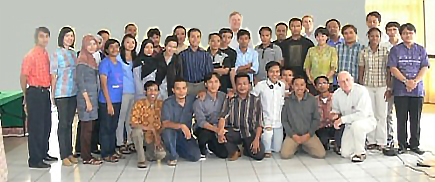
During 9-15 August 2009, ICLRS had the opportunity of joining with two Indonesian organizations, the Indonesian Legal Aid Foundation and the TIFA Foundation, and the Oslo Coalition for Freedom of Religion or Belief in providing a Training Course for Lawyers on Freedom of Religion or Belief that was held in Yogyakarta, Indonesia. ICLRS Director Cole Durham served as one of the trainers along with ICLRS Academic Advisory Board Member Tore Lindholm, Project Group Chair for the Oslo Coalition. Professors Durham and Lindholm joined Indonesian experts Adam Pantouw, Renata Arianingtyas, Zainal Abidin, and Asfinawati in helping with the development of Indonesia-focused training materials and leading the actual training sessions. The Training Course attracted a remarkable group of 28 young Indonesian lawyers from 14 provinces who have already had significant experience defending religious communities that have suffered discrimination and persecution.
Over the last five years, Indonesia has experienced an increasing number of religious freedom and religious intolerance cases across the country. The Wahid Institute (www.wahidinstitute.org) reported that the number reached more than five cases monthly, with seven cases brought to court. Through the Belief Monitoring Body (Bakorpakem) under the attorney general’s office and Law No. 1/PnPs/1965, the government of Indonesia recognizes six religions and has the authority to monitor any beliefs existant in society. The body can recommend that the government of Indonesia dissolve belief groups by providing instructional religious teachings to them and by legally dissolving an association. The most controversial case was Ahmadiyya, which was followed by attacks on Ahmadiyya communities across the country by the other Islamic radical groups. In view of this situation, it is important to train lawyers to represent and defend victims of religious intolerance cases in any stages as well as to educate victims as to their constitutional rights to protect their freedom of religion.
Professors Cole Durham and Tore Lindholm Assist with Human Rights Advocates Training Course in Jogyakarta, Indonesia
August 2009 – Yogyakarta
During 9-15 August 2009, ICLRS had the opportunity of joining with two Indonesian organizations, the Indonesian Legal Aid Foundation and the TIFA Foundation, and the Oslo Coalition for Freedom of Religion or Belief in providing a Training Course for Lawyers on Freedom of Religion or Belief that was held in Yogyakarta, Indonesia. ICLRS Director Cole Durham served as one of the trainers along with ICLRS Academic Advisory Board Member Tore Lindholm, Project Group Chair for the Oslo Coalition. Professors Durham and Lindholm joined Indonesian experts Adam Pantouw, Renata Arianingtyas, Zainal Abidin, and Asfinawati in helping with the development of Indonesia-focused training materials and leading the actual training sessions. The Training Course attracted a remarkable group of 28 young Indonesian lawyers from 14 provinces who have already had significant experience defending religious communities that have suffered discrimination and persecution.
Over the last five years, Indonesia has experienced an increasing number of religious freedom and religious intolerance cases across the country. The Wahid Institute (www.wahidinstitute.org) reported that the number reached more than five cases monthly, with seven cases brought to court. Through the Belief Monitoring Body (Bakorpakem) under the attorney general’s office and Law No. 1/PnPs/1965, the government of Indonesia recognizes six religions and has the authority to monitor any beliefs existant in society. The body can recommend that the government of Indonesia dissolve belief groups by providing instructional religious teachings to them and by legally dissolving an association. The most controversial case was Ahmadiyya, which was followed by attacks on Ahmadiyya communities across the country by the other Islamic radical groups. In view of this situation, it is important to train lawyers to represent and defend victims of religious intolerance cases in any stages as well as to educate victims as to their constitutional rights to protect their freedom of religion.
Center Co-sponsors Conference “A National Workshop on Freedom of Religion or Belief as A Human Right in Indonesia: Recognizing, Protecting and Promoting,” Yogyakarta, Indonesia, 10-12 December 2008
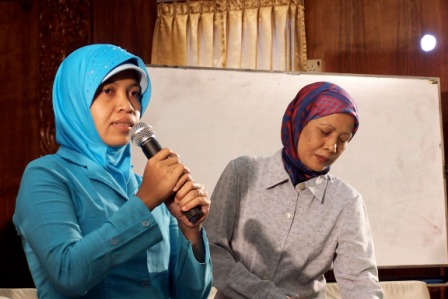
On 10-12 December 2008, the Center co-sponsored;the conference “A National Workshop on Freedom of Religion or Belief as A Human Right in Indonesia: Recognizing, Protecting and Promoting.” The conference was held in Yogyakarta, Indonesia, a spiritual capital of Indonesia. Professor Robert Smith, managing director of the Center, presented one of the opening addresses; his remarks were titled “Limiting Limitations: Recognizing the Proper Scope of Religious Freedom Limitations.” Professor Tore Lindholm, a member of the Center’s Academic Advisory Board and a member of the Oslo Coalition, also presented an opening address. Kevin Duncan, one of the Center’s Fellows, delivered closing remarks, and Professor Robert Smith gave the concluding address and officially closed the conference. Other sponsors included the Centre for Religious and Socio-Cultural Diversity at the State Islamic University of Sunan Kalijaga; The Oslo Coalition on Freedom of Religion or Belief, Norwegian Centre for Human Rights, University of Oslo, Norway; The International Center for Law and Religion Studies at Brigham Young University, Provo, Utah, USA.
Undergraduate Religious Freedom Course
Directors: Tore Lindholm and W. Cole Durham, Jr.
Sponsors: Norwegian Centre for Human Rights and the Sorenson Legacy Foundation
Description: Professors Durham and Lindholm cooperated with Noryamin Aini, Vice-Dean of the Sharî’a and Law Faculty at the State Islamic University Syarif Hidayatullah in Jakarta, to create an innovative course called “Human Rights, Sharî’a and Domestic Law,” which began in September 2007. This course is mandatory for senior law students at the university.
Islamic Courses on Freedom of Religion
Directors: Tore Lindholm and W. Cole Durham, Jr.
Sponsors: Norwegian Centre for Human Rights and the Sorenson Legacy Foundation
Description: The Norwegian Centre for Human Rights and the International Center for the Study of Law and Religion at Brigham Young University are collaborating with state universities in Indonesia to promote study of the freedom of religion or belief in Indonesia. Outside scholars include Professor W. Cole Durham, Jr., Director of ICLRS, and Professor Tore Lindholm, Chair of the Board of the Oslo Coalition on Freedom of Religion or Belief and activist scholar associated with the Indonesia Program at the Norwegian Centre for Human Rights at the University of Oslo.
Pilot Course on Freedom of Religion or Belief in Indonesia
Directors: Tore Lindholm and W. Cole Durham, Jr.
Sponsors: Norwegian Centre for Human Rights and the Sorenson Legacy Foundation
Description: ICLRS and the Norwegian Centre for Human Rights have partnered with the Centre for Religious and Socio-Cultural Diversity (CRSD) at the State Islamic University in Yogyakarta (UIN Sunan Kaluaga), headed by Director M. Rifa’i Abduh, in a graduate-level course on the freedom of religion or belief. Professors Durham and Lindholm developed course materials for a master’s level law course on the right to freedom of religion or belief in international and comparative constitutional law. An intensive pilot version of the course which lasted five days was held in Yogyakarta at the University of Indonesia Sunan Kaluaga in January-February 2007. Based on feedback from the pilot course, an informal CRSD Coordinating Committee on Freedom of Religion or Belief Training was established, with “Pak” Rifa’i Abduh serving as the overall chair working with Tore Lindholm and Cole Durham as co-chairs. Another important working group was also established, the Indonesian “Training Events Planning Group.” This group will work with the Coordination Committee to identify institutions or groups interested in and capable of planning and carrying out future training courses. In addition to being used at universities, a number of other groups, including Indonesian NGOs and religious organizations, may benefit from the course. The Training Events Planning Group is responsible for formulating concrete plans, specifying needs for external professional or financial assistance from sponsors. The goal is to conduct a small number of one-, two-, or three-day trainings courses in freedom of religion or belief in various places in Indonesia, beginning in 2008.